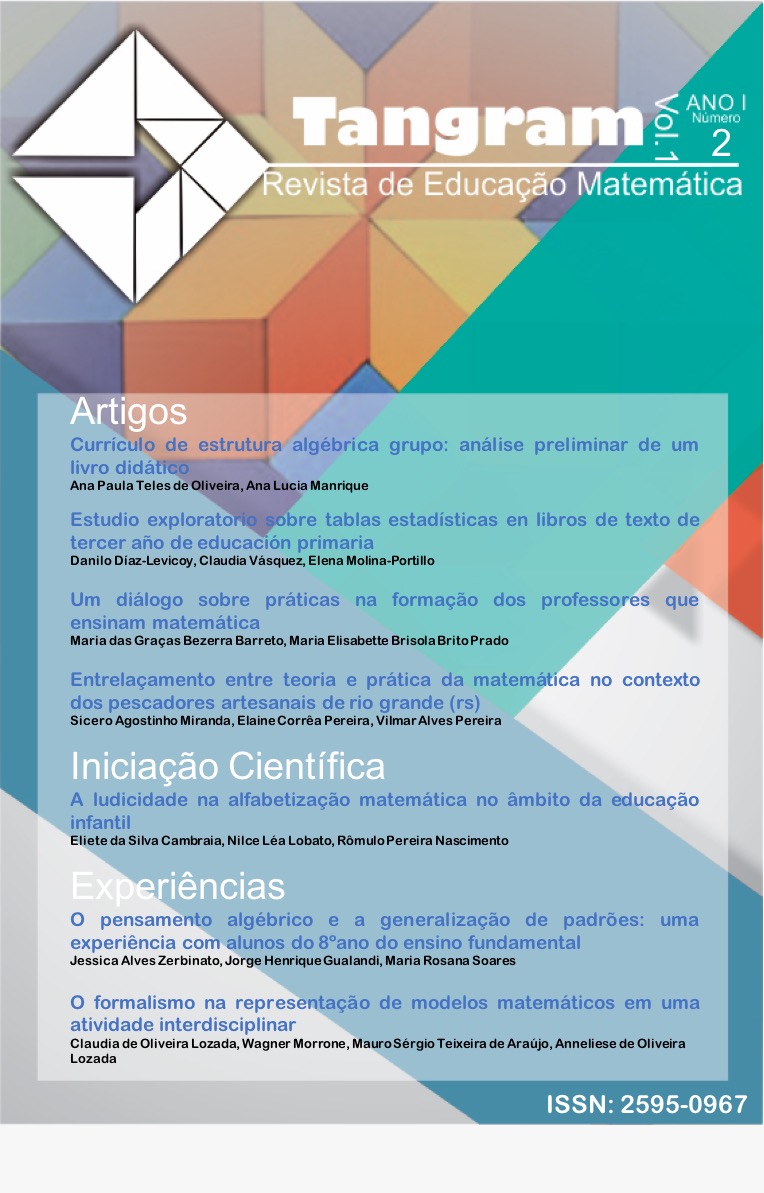Entrelaçamento entre teoria e prática da matemática no contexto dos pescadores artesanais de Rio Grande(RS)
DOI:
https://doi.org/10.30612/tangram.v1i2.7781Abstract
Neste artigo buscamos compreender se os pescadores da Ilha da Torotama, situada na Cidade de Rio Grande (RS) estabeleciam ou não relações entre a matemática do seu cotidiano da pesca artesanal com os novos conhecimentos adquiridos em sala de aula na modalidade do Ensino Educação para Jovens e Adultos (EJA). Abordagem metodológica consiste em uma pesquisa qualitativa, utilizando “Rodas de Conversa” como método de colega de dados e com a Análise Textual Discursiva (ATD) para análise. Deste processo de análise, emergem da discussão algumas categorias iniciais, entre eles a relação entre a teoria e a prática; entender na prática a teoria; importância da teoria e da matemática; aprofundamento dos conteúdos; metodologia diferenciada; modelos de escolas e interação entre eles. Surgindo então as categorias Intermediárias: relação Teoria e Prática; Importância da Matemática e Metodologia Diferenciadas. Por fim, surge à categoria final, importância das escolhas metodológicas nas relações entre teoria e prática.
Downloads
References
BERLINGHOFF, William P; GOUVEA, Fernando Q. A matemática através dos tempos. 2ª ed. São Paulo: Blucher, 2010.
BICUDO, Maria Aparecida Viggiani; GARNICA, Antonio Vicente Marafioti. Filosofia da Educação Matemática. 4ª Edição. Belo Horizonte: Autêntica, 2011.
CASEIRA, Veridiana; MIRANDA, Sícero. As possibilidades da emancipação dos sujeitos pela sociologia critica no contexto do projeto Educação para Pescadores. In: PEREIRA, Vilmar A; GONÇALVES, Leonardo D; in: Aprendizagens no Contexto do Pet Conexões Saberes da Educação Popular e Saberes Acadêmicos da FURG. Evangraf, Rio Grande, 2012.
D’ AMBRÓSIO, Ubiratan. Educação matemática: Da Teoria à Prática. Campinas, SP: Editora Papirus, 1996.
D’AMBRÒSIO, Ubiratan. Etnomatemática: elo entre as tradições e a modernidade. Belo Horizonte: Autêntica Editora, 2011.
FREIRE, Paulo. Pedagogia do compromisso: América Latina e educação popular/Paulo Freire. Indaiatuba: Villa da Letras, 2008.
FREIRE, Paulo. Pedagogia da Autonomia: saberes necessários à prática educativa. Rio de Janeiro: Paz e Terra, 2011.
KNIJNIK, Gelsa; WANDERER, Fernanda; GIONGO, Ieda Maria; DUARTE, Claudia Glavan. Etnomatemática em movimento. Belo Horizonte: Autêntica Editora, 2012.
MORAES, Roque & GALIAZZI, Maria do Carmo. Análise Textual Discursiva. Ijuí: Editora da UNIJUÍ, 2007. p. 224.
LIBÂNEO, José Carlos. Didática. São Paulo: Cortez, 1994.
LORENZATO, S. Por que não ensinar Geometria? In: Educação Matemática em Revista – SBEM 4, 2006, p. 3-13.
Downloads
Published
How to Cite
Issue
Section
License
Authors must accept the publication rules when submitting the journal, as well as agree to the following terms:
(a) The Editorial Board reserves the right to make changes to the Portuguese language in the originals to maintain the cultured standard of the language, while respecting the style of the authors.
(b) Authors retain the copyright and grant the journal the right to first publication, with the work simultaneously licensed under the Attribution-NonCommercial-ShareAlike 3.0 Brazil (CC BY-NC-SA 3.0 BR) that allows: Share - copy and redistribute the material in any medium or format and Adapt - remix, transform, and create from the material. CC BY-NC-SA 3.0 BR considers the following terms:
- Attribution - You must give the appropriate credit, provide a link to the license and indicate whether changes have been made. You must do so under any reasonable circumstances, but in no way that would suggest that the licensor supports you or your use.
- NonCommercial - You may not use the material for commercial purposes.
- Sharing - If you remix, transform, or create from material, you must distribute your contributions under the same license as the original.
- No additional restrictions - You may not apply legal terms or technological measures that legally restrict others from doing anything that the license permits.
(c) After publication, authors are allowed and encouraged to publish and distribute their work online - in institutional repositories, personal page, social network or other scientific dissemination sites, as long as the publication is not for commercial purposes.






